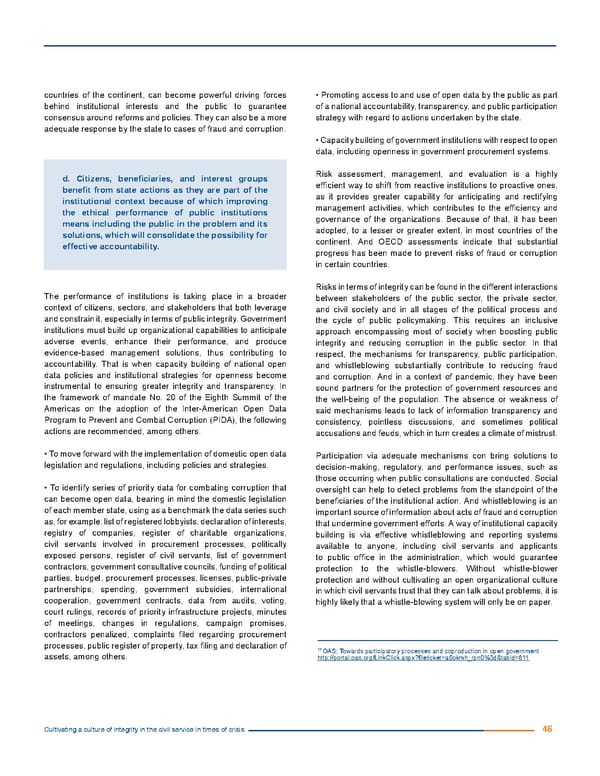countries of the continent, can become powerful driving forces • Promoting access to and use of open data by the public as part behind institutional interests and the public to guarantee of a national accountability, transparency, and public participation consensus around reforms and policies. They can also be a more strategy with regard to actions undertaken by the state. adequate response by the state to cases of fraud and corruption. • Capacity building of government institutions with respect to open data, including openness in government procurement systems. d. Citizens, beneficiaries, and interest groups Risk assessment, management, and evaluation is a highly benefit from state actions as they are part of the efficient way to shift from reactive institutions to proactive ones, institutional context because of which improving as it provides greater capability for anticipating and rectifying the ethical performance of public institutions management activities, which contributes to the efficiency and means including the public in the problem and its governance of the organizations. Because of that, it has been solutions, which will consolidate the possibility for adopted, to a lesser or greater extent, in most countries of the effective accountability. continent. And OECD assessments indicate that substantial progress has been made to prevent risks of fraud or corruption in certain countries. Risks in terms of integrity can be found in the different interactions The performance of institutions is taking place in a broader between stakeholders of the public sector, the private sector, context of citizens, sectors, and stakeholders that both leverage and civil society and in all stages of the political process and and constrain it, especially in terms of public integrity. Government the cycle of public policymaking. This requires an inclusive institutions must build up organizational capabilities to anticipate approach encompassing most of society when boosting public adverse events, enhance their performance, and produce integrity and reducing corruption in the public sector. In that evidence-based management solutions, thus contributing to respect, the mechanisms for transparency, public participation, accountability. That is when capacity building of national open and whistleblowing substantially contribute to reducing fraud data policies and institutional strategies for openness become and corruption. And in a context of pandemic, they have been instrumental to ensuring greater integrity and transparency. In sound partners for the protection of government resources and the framework of mandate No. 20 of the Eighth Summit of the the well-being of the population. The absence or weakness of Americas on the adoption of the Inter-American Open Data said mechanisms leads to lack of information transparency and Program to Prevent and Combat Corruption (PIDA), the following consistency, pointless discussions, and sometimes political actions are recommended, among others: accusations and feuds, which in turn creates a climate of mistrust. • To move forward with the implementation of domestic open data Participation via adequate mechanisms con bring solutions to legislation and regulations, including policies and strategies. decision-making, regulatory, and performance issues, such as those occurring when public consultations are conducted. Social • To identify series of priority data for combating corruption that oversight can help to detect problems from the standpoint of the can become open data, bearing in mind the domestic legislation beneficiaries of the institutional action. And whistleblowing is an of each member state, using as a benchmark the data series such important source of information about acts of fraud and corruption as, for example: list of registered lobbyists, declaration of interests, that undermine government efforts. A way of institutional capacity registry of companies, register of charitable organizations, building is via effective whistleblowing and reporting systems civil servants involved in procurement processes, politically available to anyone, including civil servants and applicants exposed persons, register of civil servants, list of government to public office in the administration, which would guarantee contractors, government consultative councils, funding of political protection to the whistle-blowers. Without whistle-blower parties, budget, procurement processes, licenses, public-private protection and without cultivating an open organizational culture partnerships, spending, government subsidies, international in which civil servants trust that they can talk about problems, it is cooperation, government contracts, data from audits, voting, highly likely that a whistle-blowing system will only be on paper. court rulings, records of priority infrastructure projects, minutes of meetings, changes in regulations, campaign promises, contractors penalized, complaints filed regarding procurement processes, public register of property, tax filing and declaration of 17 assets, among others. OAS: Towards participatory processes and coproduction in open government http://portal.oas.org/LinkClick.aspx?fileticket=a6okmh_rpn0%3d&tabid=811 Cultivating a culture of integrity in the civil service in times of crisis 46
 Cultivating a culture of integrity in the civil service in times of crisis. Page 53 Page 55
Cultivating a culture of integrity in the civil service in times of crisis. Page 53 Page 55